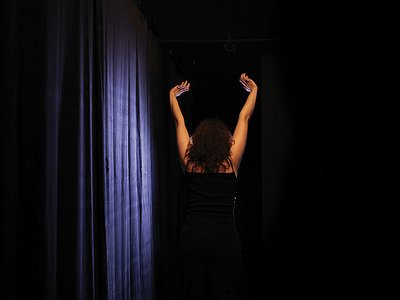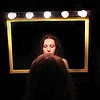Part 2
With more and more musicians creating than ever and more and more of these creations being released, what does this mean for you as an artist in terms of originality? What are some of the areas where you currently see the greatest potential for originality and who are some of the artists and communities that you find inspiring in this regard?
The Internet and new ways of communication have increased independence and individualities have immersed. A great potential for originality can be found here, more than in the collective. So this is a much bigger work to cover this immense, shapeless web for the media and the listeners and it does need attention and active involvement from them now more than ever. They could still clutch to social networks and blogs but it could only give them the wrong impression that they can see everything in a single browse.
How strictly do you separate improvising and composing?
I do improvise at the very start of a new piece. With the comings and goings in the creation process, it is necessary to adapt your gesture to what is happening and leave the sounds to reveal themselves, prior to the very controlled manipulations while coming to mixing and arranging the sequences together.
Free improvisation occurs on stage when I meet another musician. We usually don't have enough time for proper rehearsals and the best use we can extract from the little time we've got is to just go and do it. Of course the choice of the partner's important, although you learn a lot from the failures as well.
But I make a proper distinction between the two. My last solo set isn't improvised, although I allow exterior factors to affect the shape and material, the performance bringing its own writing punctuations and variations. But I usually don't record the live sets. The sum of these experiences gives me a ground to keep up in the studio and then do a tape music piece from what is left of my practice and my thoughts about it with distance.
How do you see the relationship between sound, space and composition and what are some of your strategies and approaches of working with them?
Space is a very rich and complex parameter in composition from the anecdotal side where the composer is reproducing the stereophony of our natural hearing perception to the playing with sound objects in mono which is a voluntary gesture from the composer, all the way to the sophisticated mise-en-scène, the inner space of the final piece with a tight writing and counterpoints, contrasts revealing different plans within the piece. I play with all that and the conventions the genre impose, the implicit codes we all know and accept.
What's your perspective on the relationship between music and other forms of art – painting, video art and cinema, for example – and for you and your work, how does music relate to other senses than hearing alone?
I've been told my music has an organic feel, very tactile material which shows a visceral relationship to the work, the tension and release form improving this sensation of multidimensional space which would be similar to a film without images. Well I quite agree with that, knowing that I use suspense and tension and bit similar dramatic impulses as it would be in a thriller. But this said, such comparisons are only effective when you try to get a rational explanation.
This is the object of the text I recently wrote on The Out Door's "200 Words" column, trying to recreate this multilayered and permanent flux of ideas and memory snapshots you endlessly try to order and control.
What's your view on the role and function of music as well as the (e.g. political/social/creative) tasks of artists today - and how do you try to meet these goals in your work?
The artist is the one who is the recipient of consciousness. We keep our compatriots in touch with things that can not totally be apprehended in a rational way, that leave existence to the subjective, the invisible, the sensitive. I'm very aware of the fact that these are notions which are subordinated to entertainment and profit. But it always somehow filters through, finds its way, keeps fighting the obscurantism that the social pressure in general try to impose on us. So being an artist is being reticent about making compromises, it is being suspicious towards power but attentive to others. Music goes beyond social matters.
Listening is also an active, rather than just a passive process. How do you see the role of the listener in the musical communication process?
The listener defines you in the sense that you will chose a certain way of expressing what you want to express considering the person you have in front of you. The listener tears you out of the monologue you've been into while composing, he's the solution of the problem you're trying to solve through abstract considerations and comes and concludes the whole process because he brings your endless inner speech to some end, gives it an object with a start and finish.
Reaching audiences usually involves reaching out to the press and possibly working with a PR company. What's your perspective on the promo system? In which way do music journalism and PR companies change the way music is perceived by the public?
The same as it ever was. A certain percentage of the audience is just the same as the press, one voice. You've got to know the right people and have enough money for a proper PR campaign or you're nobody. If you don't have one of those two, you have to pass through a certain amount of disrespect, humiliation, small talk to simply get your music heard. Despite what it is supposed to stand for, this percentage is quite high in the experimental music audience.
Do you have a musical vision that you haven't been able to realise for technical or financial reasons – or an idea of what music itself could be beyond its current form?
Well I know for a fact that we haven't yet explored the possibility of the multi-speaker orchestra enough. Concerts only offer a frontal interpretation, the whole ritual is oriented to the stage but there are other ways to explore the sonic material. I love playing frontal but too little effort has been made by the promoters and the concert venues to favour multi-speakers diffusion. I wish I could have more options right away.
Visit the website of Bérangère Maximin for more information on her work and upcoming performances.






